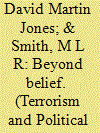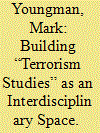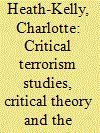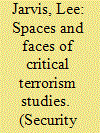|
|
|
Sort Order |
|
|
|
Items / Page
|
|
|
|
|
|
|
| Srl | Item |
| 1 |
ID:
095295


|
|
|
|
|
| Publication |
2010.
|
| Summary/Abstract |
The development of radical Islamist strategic thinking and the impact of post-modern, Western styles of thought upon the ideology that informs that strategy is often overlooked in conventional discussions of homegrown threats from jihadist militants. The propensity to discount the ideology informing both al-Qaeda and nominally non-violent Islamist movements with an analogous political philosophy like Hizb ut-Tahrir neglects the influence that critical Western modes of thought exercise upon their strategic thinking especially in the context of homegrown radicalization. Drawing selectively on non-liberal tendencies in the Western ideological canon has, in fact, endowed Khilaafaism (caliphism) with both a distinctive theoretical style and strategic practice. In particular, it derives intellectual sustenance from a post-Marxist Frankfurt School of critical thinking that in combination with an "English" School of international relations idealism holds that epistemological claims are socially determined, subjective, and serve the interests of dominant power relations. This critical, normative, and constructivist approach to international relations seeks not only to explain the historical emergence of the global order, but also to transcend it. This transformative agenda bears comparison with radical Islamist critiques of Western ontology and is of interest to Islamism's political and strategic thinking. In this regard, the relativist and critical approaches that have come to dominate the academic social sciences since the 1990s not only reflect a loss of faith in Western values in a way that undermines the prospects for a liberal and pluralist polity, but also, through a critical process facilitated by much international relations orthodoxy, promotes the strategic and ideological agenda of radical Islam. It is this curious strategic and ideological evolution that this paper explores.
|
|
|
|
|
|
|
|
|
|
|
|
|
|
|
|
| 2 |
ID:
175713


|
|
|
|
|
| Summary/Abstract |
Over the years, there have been many debates regarding the state of research into terrorism and whether “terrorism studies” constitutes an academic discipline in its own right. Such reflections, coupled with the natural evolution of what is still a relatively new area of research, have arguably led to significant improvements in quality and rigour. At the same time, the status of terrorism studies itself remains somewhat ambiguous: it is both discussed as a distinct field and simultaneously evades criticism by pointing to the difficulties of defining its boundaries. There are undoubtedly a number of advantages to forming a separate discipline, which would go some way to helping the field address some of the recurring problems that terrorism research faces. However, this article ultimately argues that scholars are better served by deliberately moving in the other direction and developing the field as a space for interdisciplinary engagement.
|
|
|
|
|
|
|
|
|
|
|
|
|
|
|
|
| 3 |
ID:
097739


|
|
|
|
|
| Publication |
2010.
|
| Summary/Abstract |
This article problematizes how Critical Terrorism Studies (CTS) utilizes Coxian and Frankfurt School Critical Theory to support an emancipatory project. The article broadly takes the example of CTS to illustrate the dangers of the 'pearl fishing' method, occasionally used within critical international relations, where a section of a philosophical position is appropriated without regard for the whole. As Horkheimerian Critical Theory relies upon a far broader philosophy than CTS acknowledges, it is argued that the appropriated emancipatory foundation cannot make sense in soundbite form. Such stunted interaction with the wider philosophy of Critical Theory leaves CTS susceptible to the charge of logical error, specifically that contained in the 'naturalistic fallacy'. The naturalistic fallacy is a charge drawn from the philosophy of logic that takes improper derivation of 'ought' from 'is' within argumentation as its referent. The relationship between international relations and Critical Theory does not have to be so unsatisfactory, however, and this article concludes with suggestions for a route whereby emancipatory commitment might be adopted without such problems of normative origination.
|
|
|
|
|
|
|
|
|
|
|
|
|
|
|
|
| 4 |
ID:
087472


|
|
|
| 5 |
ID:
106577


|
|
|
| 6 |
ID:
086327


|
|
|
|
|
| Publication |
2009.
|
| Summary/Abstract |
This article explores the burgeoning academic interest in establishing a critical terrorism studies research programme. It begins by reviewing the debates over definition, causation and response that still dominate mainstream discussions of terrorism. The analytical and normative limitations of these debates, it argues, open considerable space for the emergence of a critically oriented body of literature. A second section then explores two distinct efforts at overcoming these limitations: the broadening and interpretivist faces of critical terrorism studies. The broadening face refers to attempts to expand our understanding of terrorism beyond non-state violence alone, while the interpretivist face comprises critical explorations of terror in image and narrative. Although each of these approaches offers scholars a more engaged role than the problem-solving orientation of the mainstream debates, the article argues that only the interpretivist face is capable of addressing their analytical limitations. The article concludes by calling for further attention to the notion of critique within the relevant critical literature.
|
|
|
|
|
|
|
|
|
|
|
|
|
|
|
|
| 7 |
ID:
172203


|
|
|
|
|
| Summary/Abstract |
The ‘suspect community’ thesis has been a primary tool for exploring counter-terrorism strategies like the UK’s PREVENT and their effect on communities. However, in seeking to shed light on the differentialist, complex nature of modern counter-terrorism, it was recently redesigned by Ragazzi as the ‘suspect category’ thesis. This article engages with this thesis’ concept of distinguished ‘risky’ and ‘trusted’ suspect categories defining PREVENT’s counter-terrorism engagement with Muslim communities. With the author’s own reservations about this thesis, this article also explores this important concept to critically assess PREVENT as a counter-terrorism strategy. Principally, it provides an exploration of PREVENT’s construction of risky and trusted suspect categories and their potential for fostering alienation, as well as a reflection on the effects of alienation on counter-terrorism. These discussions prove that PREVENT fosters alienation that is detrimental to counter-terrorism efforts. Damaging constructions as such not only make PREVENT redundant, but are also emblematic of Jackson’s theory of the epistemological crisis of counter-terrorism, as this article will discuss. Recommendations regarding rethinking the conceptual basis for PREVENT will be also made with a specific emphasis on addressing the epistemological crisis of counter-terrorism.
|
|
|
|
|
|
|
|
|
|
|
|
|
|
|
|
| 8 |
ID:
113817


|
|
|
|
|
| Publication |
2012.
|
| Summary/Abstract |
This paper uses Patrick Thaddeus Jackson's monism/dualism distinction to clarify ongoing methodological debates among students of critical terrorism studies (CTS). We map the distinction onto the CTS literature and emphasize the distinctive ontological starting points and the distinctive epistemological frameworks entailed by each perspective. Then we critically engage monistic, or interpretivist, CTS research, especially that of Richard Jackson. We argue for a more methodologically explicit and logically consistent interpretivist CTS and we suggest three important steps that researchers can take to achieve this aim: (i) take an explicit ontological stance; (ii) embrace reflexivity; (iii) conceptualize terrorism as a meaning-making practice.
|
|
|
|
|
|
|
|
|
|
|
|
|
|
|
|
|
|
|
|
|